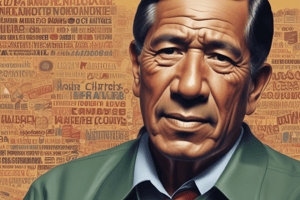Podcast
Questions and Answers
Apa yang dimaksud dengan sumber sekunder dalam penulisan biografi?
Apa yang dimaksud dengan sumber sekunder dalam penulisan biografi?
- Struktur naratif yang jelas dan menarik
- Bahasa deskriptif yang membawa subjek ke dalam kehidupan
- Buku, artikel, dan bahan lain yang memberikan konteks dan wawasan tambahan (correct)
- Wawancara dengan orang yang mengenal subjek
Teknik penulisan apa yang digunakan untuk membawa subjek ke dalam kehidupan?
Teknik penulisan apa yang digunakan untuk membawa subjek ke dalam kehidupan?
- Show, don't tell (correct)
- Struktur naratif
- Balancing fact and interpretation
- Objectivity
Apa yang perlu dihindari dalam penulisan biografi?
Apa yang perlu dihindari dalam penulisan biografi?
- Struktur naratif yang jelas
- Bahasa deskriptif
- Bias dan sensationalisme (correct)
- Wawancara dengan orang yang mengenal subjek
Tantangan apa yang dihadapi dalam penulisan biografi?
Tantangan apa yang dihadapi dalam penulisan biografi?
Apa yang perlu diingat dalam penulisan biografi?
Apa yang perlu diingat dalam penulisan biografi?
Struktur biografi yang mengorganisasikan kehidupan subjek dalam garis waktu yang linier disebut?
Struktur biografi yang mengorganisasikan kehidupan subjek dalam garis waktu yang linier disebut?
Apa yang perlu diperhatikan dalam memahami konteks historis subjek?
Apa yang perlu diperhatikan dalam memahami konteks historis subjek?
Analisis karakter yang digunakan untuk memahami subjek meliputi?
Analisis karakter yang digunakan untuk memahami subjek meliputi?
Apa yang dapat digunakan untuk memperoleh informasi pertama tangan tentang subjek?
Apa yang dapat digunakan untuk memperoleh informasi pertama tangan tentang subjek?
Apa yang perlu diperhatikan dalam menulis biografi dengan struktur hibrid?
Apa yang perlu diperhatikan dalam menulis biografi dengan struktur hibrid?
Flashcards are hidden until you start studying
Study Notes
Definition and Purpose
- Biography writing is the process of researching and writing a detailed account of a person's life, including their experiences, achievements, and contributions.
- The purpose of biography writing is to provide an accurate and engaging portrayal of the subject's life, often to educate, inspire, or entertain readers.
Types of Biographies
- Autobiography: Written by the subject themselves, often providing a personal and introspective perspective.
- Memoir: A personal narrative that focuses on a specific aspect or period of the subject's life.
- Authorized biography: Written with the subject's consent and often includes access to private documents and interviews.
- Unauthorized biography: Written without the subject's consent, often relying on publicly available information.
Key Elements of a Biography
- Chronology: A clear and accurate timeline of the subject's life, including important dates and events.
- Character development: A nuanced and multi-dimensional portrayal of the subject's personality, motivations, and relationships.
- Context: The historical, social, and cultural context in which the subject lived, including significant events and trends.
- Themes: Recurring ideas or patterns that emerge from the subject's life, such as struggles, triumphs, or passions.
Research Techniques
- Primary sources: Original documents, letters, diaries, and interviews that provide firsthand information about the subject.
- Secondary sources: Books, articles, and other materials that provide additional context and insights.
- Interviews: Conducting interviews with people who knew the subject, including family members, friends, and colleagues.
Writing Techniques
- Narrative structure: Using a clear and engaging narrative structure to tell the subject's story.
- Show, don't tell: Using descriptive language and anecdotes to bring the subject's life to life.
- Objectivity: Striving to maintain a balanced and impartial perspective, avoiding bias and sensationalism.
Challenges and Considerations
- Balancing fact and interpretation: Separating verifiable facts from the writer's interpretation and analysis.
- Maintaining accuracy: Ensuring that the biography is accurate and reliable, without errors or inaccuracies.
- Respecting the subject: Approaching the subject's life with sensitivity, respect, and empathy.
Studying That Suits You
Use AI to generate personalized quizzes and flashcards to suit your learning preferences.




